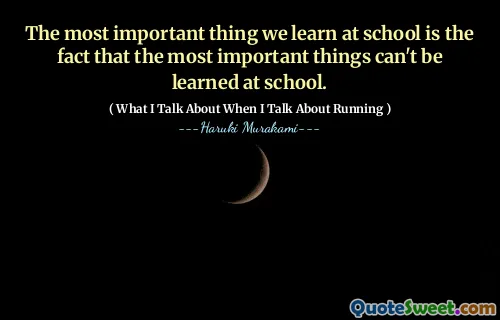Some people can work their butts off and never get what they're aiming for while others can get it without any effort at all.
In Haruki Murakami's book "What I Talk About When I Talk About Running," he reflects on the varying experiences of people in pursuit of their goals. He notes that some individuals dedicate significant effort and time yet struggle to achieve their ambitions, while others may attain their objectives with seemingly minimal effort. This disparity raises questions about the nature of success and the different paths people take in their endeavors.
Murakami's observations highlight the complexities of ambition and achievement. It suggests that hard work does not always guarantee results, and there might be factors beyond one's control that influence outcomes. This perspective encourages readers to consider the unpredictability of success and the importance of perseverance, regardless of where they stand in their journey.






